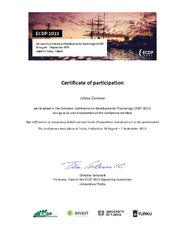Приказ основних података о документу
Age differences in conspiracy beliefs around Covid-19 pandemic and (dis)trust in the government
| dc.creator | Ćeriman, Jelena | |
| dc.creator | Đorđević, Ana | |
| dc.date.accessioned | 2023-11-13T19:32:39Z | |
| dc.date.available | 2023-11-13T19:32:39Z | |
| dc.date.issued | 2023 | |
| dc.identifier.uri | https://sites.utu.fi/ecdp2023/wp-content/uploads/sites/1180/2023/09/ECDP2023_abstracts.pdf | |
| dc.identifier.uri | http://rifdt.instifdt.bg.ac.rs/123456789/3201 | |
| dc.description.abstract | Objective: Times of societal crisis, such as the COVID-19 pandemic, during which people need to make sense of a chaotic world and to protect their health and lives, according to psychological research, represent suitable ground for the development of conspiracy theories about origins, spread, and treatment of the threat (coronavirus). Although numerous studies have been conducted on this issue since the beginning of the pandemic until today, most of the studies were conducted on the adult population with limited insights into development of the conspiracy beliefs in adolescence or over the lifespan. Objective of this study is precisely to explore how conspiracy beliefs regarding COVID-19 pandemic differentiate between multiple age groups (cross-sectional design), what are their sources and contexts, and how do they relate with the tendency to trust the government. Methodology: Data were gathered through eight focus group discussions with four age groups (11-12, 14-15, 18-19, 30+) in Serbia. Results: Based on critical discourse analysis, this paper identifies the differences in content and the sources of conspiracy thinking and how it relates to trust in the government. Study shows that high distrust in Serbian government is associated with conspiracy beliefs both within youth and adults. However, while among adolescents this finding is exclusively related with their beliefs that ruling structures have financial gain from the pandemic, against the interests of citizens, among adults it is related to the belief that the government (un)intentionally submits to the new global order that is managed by one or more powerful actors who are coordinated in secret action to achieve an outcome that is of public interest, but not public knowledge. Conclusion: The results will be discussed within current socio-political climate in Serbia, as well as the basis for understanding psychological factors which may underlie these tendencies in conspiracy theorizing, such as social identification, collective narcissism, authoritarianism, and social dominance orientation. | sr |
| dc.language.iso | en | sr |
| dc.relation | EnTrust project, EU Horizon 2020, grant No. 870572 | sr |
| dc.rights | openAccess | sr |
| dc.rights.uri | https://creativecommons.org/licenses/by/4.0/ | |
| dc.source | European Conference on Developmental Psychology (ECDP) 2023, 28 August – 1 September, 2023, Turku, Finland | sr |
| dc.subject | conspiracy beliefs | sr |
| dc.subject | covid-19 pandemic | sr |
| dc.subject | focus-groups | sr |
| dc.subject | Serbia | sr |
| dc.subject | trust | sr |
| dc.subject | distrust | sr |
| dc.subject | age differences | sr |
| dc.title | Age differences in conspiracy beliefs around Covid-19 pandemic and (dis)trust in the government | sr |
| dc.type | conferenceObject | sr |
| dc.rights.license | BY | sr |
| dc.citation.spage | 575 | |
| dc.citation.epage | 575 | |
| dc.type.version | publishedVersion | sr |
| dc.identifier.fulltext | http://rifdt.instifdt.bg.ac.rs/bitstream/id/10970/ECDP2023_abstract_Djordjevic_Ceriman.pdf | |
| dc.identifier.rcub | https://hdl.handle.net/21.15107/rcub_rifdt_3201 |

